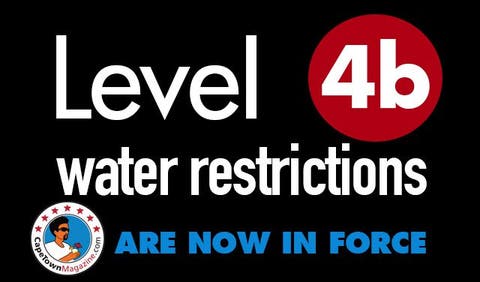Current Water Restrictions For Cape Town Residents
Here's some tips to save water in the Mother City
Last Updated 3 July 2018
LATEST UPDATE CAPE TOWN
This article is about the water restrictions imposed in July 2017. But as of 2 July 2018, dam levels have improved significantly, so much that the City believes that current conditions warrant a relaxation of the restrictions. It is no longer a matter of “how many days of water are left for the City of Cape Town”. Read the latest update on the water situation in Cape Town this week.
---
Last Updated 5 June 2017
Cape Town had been under Level 3 water restrictions since 1 November 2016 and showed no signs of easing-up. The City of Cape Town’s Council increased it to Restriction level 4 on 1 June 2017, however with increasing water consumption and not enough rain easing the drought - The City of Cape Town has raised the restriction level to 4b as of 1 July 2017.
The increasing water restrictions come as a result of the drought experienced in Cape Town and the failure to reach the targeted savings of an initial 800 million litres of collective water use per day. With the new water restriction implementation, the targets savings allotment has been revised to 500 million litres of collective water a day. The Council has met throughout the year to discuss possible solutions to the crisis. The latest suggestion has resulted in Level 4b restrictions effective from 1 July 2017.
Dam storage levels are at 24,5%, with the last 10% of a dam’s water mostly not being useable, meaning that the dam levels are effectively at 14,5%. Consumption is 630 million litres per day - 130 million litres above the current usage target of 500 million litres per day. Level 4b restrictions require all water users to use less than 87 litres of water per person per day, whether you are at home work or anywhere else.
“We must continue to use less than 100 litres of water per person per day in total, whether we are at home, work, school or elsewhere. It may take a few seasons of normal rainfall for the dams to recover and we must bear in mind that we are expecting an even tougher summer in 2018[.]” said the City’s Mayoral Committee Member for Informal Settlements, Water and Waste Services; Councillor Xanthea Limberg
Similar to the Level 4 water restriction, level 4b will also ban all use of municipal water outside and for non-essential use, and now limits residents to 87 liters of water per person, per day. This means you will be unable to wash cars, water gardens, use irrigation systems with municipal drinking water and of course no new golf course or sport fields to be built unless they will be watered with non-potable water.
The Level 3 restrictions had allowed gardening by watering can for an hour on Tuesday and Saturday, but with Level 4 and 4b restrictions this is no longer possible. Filling and topping up swimming pools is also not allowed. The Level 4b restrictions also comes with sanitation tips such as using old bath water to fill the toilet cistern and not flushing each time the toilet is used.
''Use water only for drinking, cooking and essential washing[.] Every single drop that is wasted or saved is making a difference to our dam levels,” said the Councillor.
The proposed fines for overuse still have to be approved by the council and the Chief Magistrate, but they range between R1 000 and R5 000 for a spot fine. The city has continued to implement and sustain its pressure reduction programmes across the metro which forcibly reduces supply at a given time. Other emergency interventions are under way, and if required, the City will start to implement a lifeline supply of water across the metro.
SIX HELPFUL WATER SAVING TIPS
- Water your plants with excess water from cooking and cleaning.
- Turn the tap off while washing your hair.
- Use a pool cover to prevent water evaporation.
- If you have a water meter, use it to check for water leaks.
- Fill a container with water while waiting for your tap water to heat up, instead of letting it run.
- Limit your water usage when brushing your teeth to a cup of water.
- Ensure that all taps are fully closed and replace tap washers regularly. A dripping tap can waste 30-litres a day; equivalent to 10 000-litres a year.
- Fit tap aerators to reduce and spread the flow. This saves water yet feels like one is using the same amount of water.
By Garth Prins & Tarina Meiring
---
Check out these helpful Top Tips for Saving Electricity on Earth Day in Cape Town. Find out why Chapman's Peak is closed and laternative routes to take.
---
Use our events section for an up-to-date overview of happenings in Cape Town. Also, don’t forget to subscribe to our newsletter and if you have a smart phone, add m.capetownmagazine.com to your home screen for quick access on the go!
Follow us on Twitter, like us on Facebook, join our Google+ circle, connect with us on LinkedIn, check out our photos on Instagram and follow our Pinterest boards for updates on what’s happening in and around the Mother City!
CapeTownMagazine.com
| For Moments of Joy. Follow our social channels for useful news, daily local champions | |
| 072 350 2062 | |
| Ideas Cartel, The Old Foundry, 1 Sand Hill Road, Green Point | |
| www.capetownmagazine.com/subscribe | |
| now@capetownmagazine.com | |
| CapeTownMag | |
| CapeTownMagazine.com | |
| capetownmag | |
